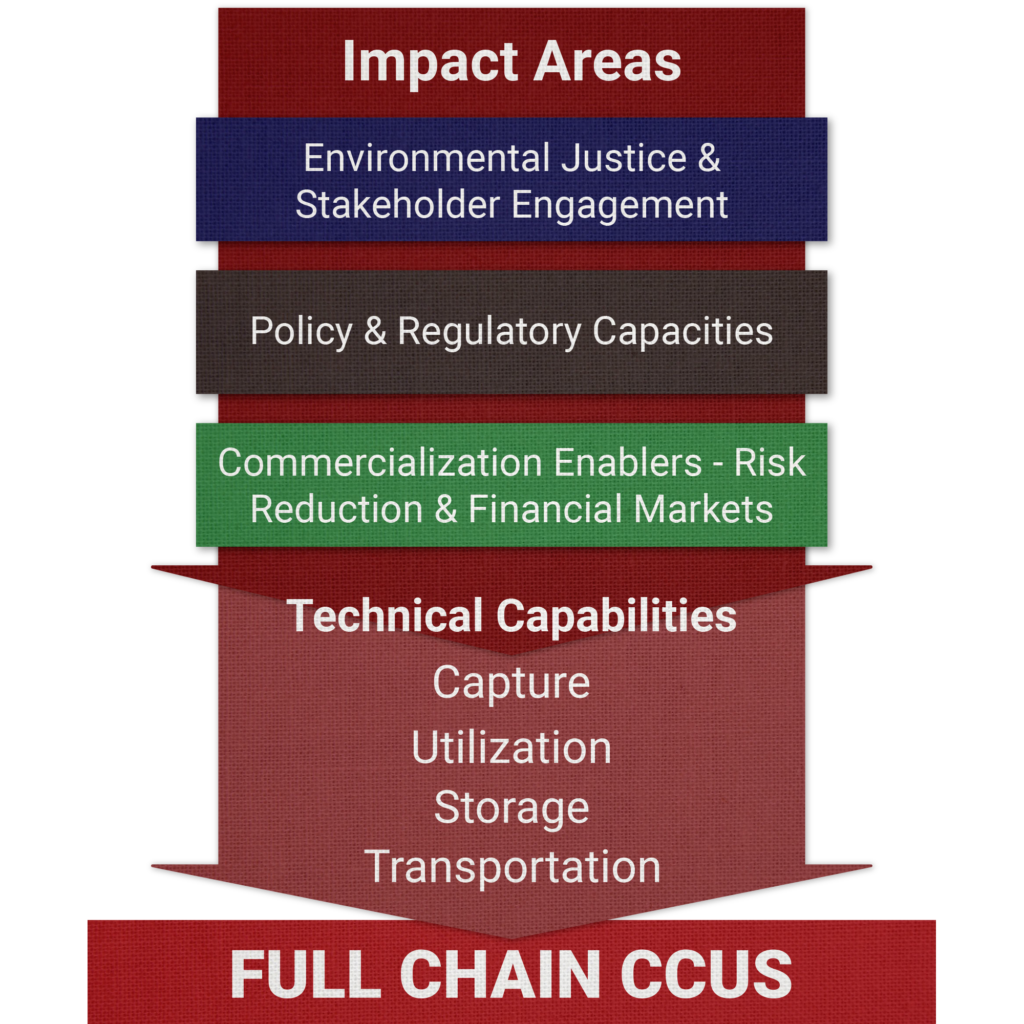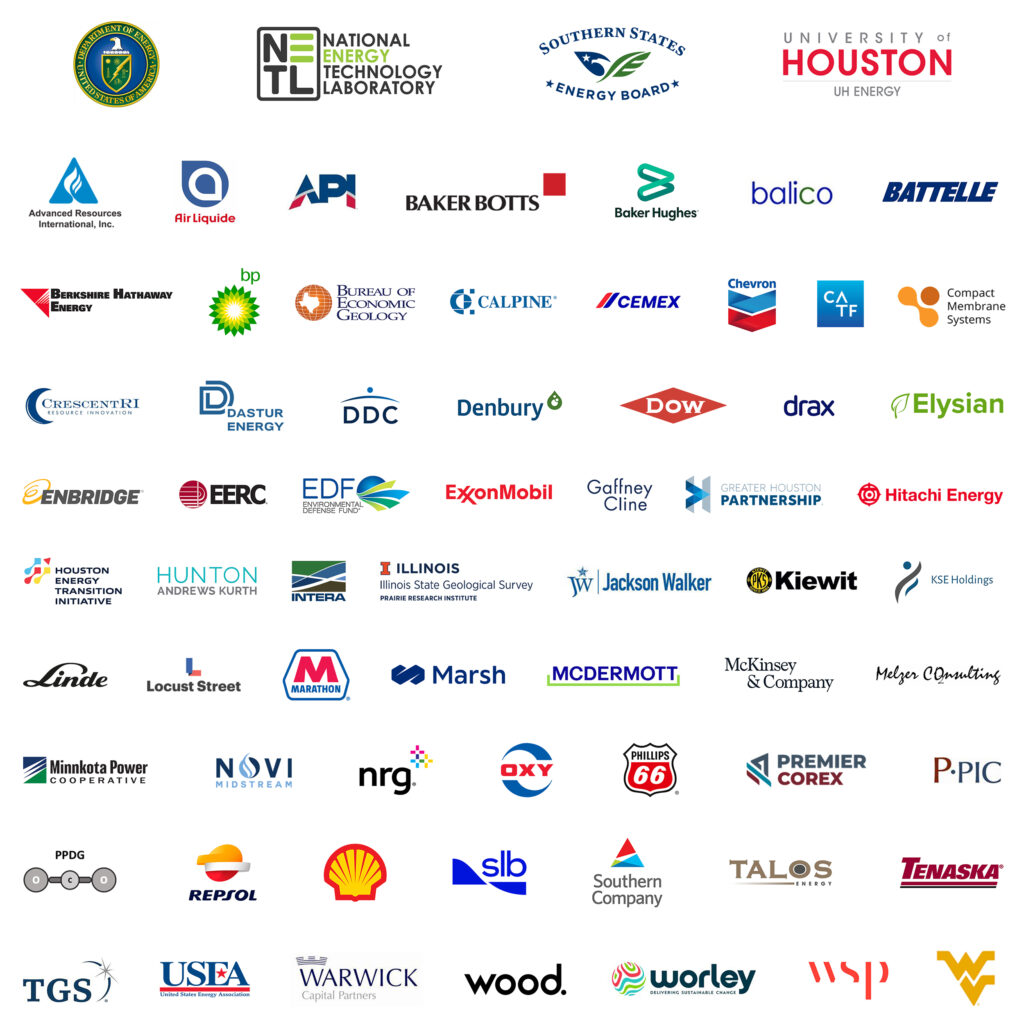In 2020, Southern States Energy Board, together with the University of Houston’s Center for Carbon Management in Energy, established the Carbon Capture, Utilization, and Storage (CCUS) Commercialization Consortium.
The Consortium is comprised of subject matter experts from more than 55 companies and organizations and includes the four DOE-funded Regional Initiatives. The broad mission of the Consortium is to identify risks and uncertainties across the CCUS value chain and catalyze industry investment outside of existing technical research programs.
Through the expertise of its membership, the Consortium operates outside of the purview of existing research programs and leverages its vast network to communicate industry activities and support ongoing research and commercialization efforts. To this end, the Consortium focuses its efforts on ‘Transformative’ issues, or those that impact the full CCUS value chain and without which commercialization of CCUS is improbable.

Consortium Partners

Consortium Responsibilities
Task 1: Project Management
Subtask 1.1: Maintaining the Consortium
SSEB and UH-CCME will continue to host regular consortium meetings to discuss industry CCUS activities and identify emerging obstacles to the commercial deployment of CCUS. In addition, SSEB and UH-CCME will assess project personnel and evaluate existing competencies within the University of Houston to enhance available personnel and support the mission of the Consortium. The Project Management team will continue to evaluate Consortium membership to recruit industries not currently represented. The Project Management team will evaluate the status of the Consortium with the goal of identifying funding mechanisms for a self-sustaining entity in out years. Due to the involvement of the Regional Initiatives, activities of the Consortium will complement and not duplicate existing research and development efforts. The Project Management team will maintain work with subject matter experts to evaluate challenges related to capture, transportation, utilization, and storage and identify areas where the Consortium can assist. Where appropriate, the Consortium will communicate its activities to state regulators, legislative leaders, industry, and the public. Frequent updates on Consortium activities will be provided to DOE through quarterly technical progress reports.
Subtask 1.2: Providing CCUS Commercialization Support to Industry
The Consortium will seek opportunities to provide CCUS facility design support to industry. This will be achieved by hosting strategic planning meetings with industry tailored to their specific needs and by providing subject matter expertise to industry for specific project design. This activity will be performed in collaboration with the Regional Initiatives and, as appropriate, other DOE and NETL-funded carbon management program partners.
Task 2: Stakeholder Engagement and Environmental Justice
Subtask 2.1: Coordinate Networking Meetings, Informational Webinars, and Develop an Internet Presence
The Consortium will identify and host events with the goal of promoting commercialization by bringing together project developers, investors, subject matter experts, regulators, and state legislators. Further, the Consortium will host regular informational webinars to communicate industry news and discuss recent advances of CCUS technologies. Last, the Consortium will develop an online presence to further the communication of CCUS to the general public.
Subtask 2.2: Environmental Justice
The Consortium will coordinate with subject matter experts to engage with environmental justice leaders to better understand perspectives related to the energy transition and the concerns of affected communities. As part of this, the Consortium will work towards better understanding environmental justice concerns as they relate to all aspects of the CCUS value chain. The Consortium will engage the Regional Initiatives to determine how environmental justice concerns vary by region.
Subtask 2.3: Workforce Transition
The Consortium will work with operational and developing CCUS projects to determine how facility-level actions impact existing workforce and local communities. The findings of this work will be communicated to a diverse group of stakeholders including industry and state governments. The Consortium will communicate with state and local officials regarding areas where CCUS technologies will likely be deployed to discuss incentivizing the creation of CCUS jobs. Finally, the Consortium will utilize online and offline communications advertising CCUS jobs to college students and to emphasize opportunities for retraining.
Task 3: Policy and Regulatory Capacities
Subtask 3.1: Permitting
The Consortium will engage state government officials and assess (compare and contrast) existing regulatory frameworks to identify permitting authorities and processes for CCUS-related activities under state purview.
The Consortium will coordinate with operational and developing CCUS projects and identify industry-specific air permitting processes for capture facilities (lessons learned, time and financial commitment).
The Consortium will identify neighboring states included in existing commercialization scenarios and compile state-level pipeline permitting requirements to identify potential challenges to the development of interstate pipeline infrastructure.
Subtask 3.2: Assist States with Class VI Primacy
The Consortium will recognize states that are required to, or may wish to, pursue state primacy and communicate the benefits through informational meetings with state legislative leaders. Further, the Consortium will work with states that have received Class VI primacy to develop a compilation of lessons learned for states interested in pursuing this regulatory action.
Subtask 3.3: Long-term Site Stewardship
The Consortium will compile applicable state-level long-term site stewardship legislation and share this information with state legislative leaders.
Task 4: Commercialization Enablers – Risk Reduction and Financial Markets
Subtask 4.1: Capture
The Consortium will address capture-related commercialization enabler topics based on findings from other tasks and industry feedback.
Subtask 4.2: Transportation
The Consortium will address transportation-related commercialization enabler topics based on findings from other tasks and industry feedback.
Subtask 4.3: Storage
The Consortium will work with industry to identify existing uncertainties and areas of concern related to storage risks. Further, the Consortium will identify potential collaboration with the Regional Initiatives or other DOE programs (e.g., CarbonSAFE, GoMCarb, SECARB-Offshore).
Subtask 4.4: Utilization
For Life-Cycle Assessment and cost-benefit analysis, the Consortium will work with industry subject matter experts to review existing NETL LCA guidance and identify areas where industry may contribute to existing efforts. The Consortium will coordinate information exchange between industry and NETL’s CO2U LCA team.
The Consortium also will communicate with industry subject matter experts to identify potential mechanisms to incentivize the development and marketing of low-carbon products or fuels.

